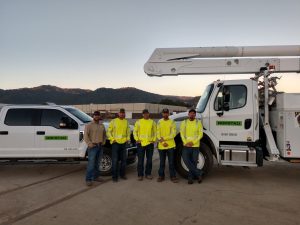On September 22, an IBEW 1245 line crew from Rockstad Power was wrapping up work after a routine pole change-out when their day took an unexpected turn. As the crew was heading back to the Ukiah yard from Lakeport, they spotted a small brush fire, which apparently started when a pickup truck had lost its drive shaft.
IBEW Journeyman Linemen Edwin Peterson and Anthony Huck were driving by when Peterson first noticed the small flames, about the size of a campfire. They immediately pulled over to the side of the road and began unloading water cans, shovels and rakes from their truck.
“There were already bystanders there trying to help, but they didn’t have anything to put it out,” said Huck, a four-year member of Local 1245. “We started moving quickly, handing out tools and using our indian packs to stop the fire.”
“It was dry and moving fast,” added Peterson, who comes out of Local 175 in Tennessee. “Huck and I took off up the hill and tried to stop it from going farther.”
“I think we helped slow it down, but soon there was no stopping it,” said Huck. “I was amazed how fast it took off.”

The crew, from left: General Foreman Kyle Sparks, Foreman Trey Woodruff, Lead Lineman Edwin Peterson, Lineman Anthony Huck and Groundman Tyler Noel
Crew Foreman Trey Woodruff and Groundman Tyler Noel arrived less than a minute later. As Peterson and Huck headed toward the blaze with water cans, Woodruff and Noel decided to head around the fire the other way to beat it back and warn residents of the danger. They estimated the fire had grown to 100 square feet in less than a minute.
Conditions were ripe for disaster. The crew knew they could not stop the blaze, but they could try to slow it down while they waited for firefighters to arrive. And that’s just what they did.
Working together, the crew was able to gain control of the fire, keeping it away from the waist-high brush that the Mendocino Complex Fire had somehow missed when it ravaged the area less than two months earlier. Through their efforts, six houses to the north and four houses to the southwest were kept out of danger until CALFIRE arrived on the scene with 50 firefighters, truck engines and bombers to drop fire retardant on the blaze.
“Once the firefighters got there, we did the right thing and got our trucks out of the way. We didn’t want to slow them down,” said Woodruff.
All told, the fire consumed one abandoned building, approximately 50 acres of land, and a couple of vehicles. One relieved resident said the fire came within 75 feet of his house, and another thanked the crew for saving his grandmother’s home.
“This is just what we do. We’re union and we’re proud of the area that we work in,” said Woodruff, who hails from Local 66 in Texas but has been working in California since 2012. “We don’t just change poles and keep the lights on. If we see a car on the side on the road, we stop and help them change a tire. If there’s anything we can do to help, we always stop. This is our community.”
The crew had received training on how to react in a fire situation in case they encounter one on the job, so they were fully prepared and knew exactly what to do. Because they work in remote areas, they are equipped with basic firefighting equipment on their trucks in case they happen to be the first on the scene, like they were that day.
“Their training went into effect as linemen and as a crew – they worked together really well,” said Woodruff. “They went into action. And I was proud of them.”
“We’re taught good safety standards. Always be your brother’s keeper. Watch your back, and know your surroundings.” said Peterson. “And we have good equipment from Rokstad.”
Woodruff and his crew had been through several California wildfires and witnessed their devastation firsthand. He recalled working in the areas that had been decimated by fires, in order to make them safe and restore power, and the emotional experience they had interacting with those residents who had lost everything.
“We’re here to do whatever PG&E needs us to do– and whatever we can — to help the community,” he said.
“Other linemen and I worked on the Redding fire and the Mendocino fire — and the Santa Rosa fire last year,” said Huck. “After seeing all the fire damage, you have to stop and try to help if you can. In our work, you have to be prepared for anything at any moment and be ready to assist.”
That day, the crew proved that IBEW members are always ready and willing to do whatever it takes to help out and protect the community – and they’re proud to do it.